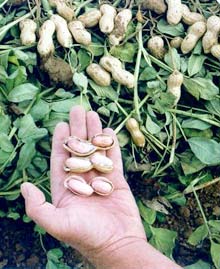Hebrew University Research Brings Higher Peanut Yields

Increased peanut pod sizes <br>© Hebrew University
Significantly improved peanut yields have been achieved by researchers at the Hebrew University Faculty of Agricultural, Food and Environmental Sciences in Rehovot.
Through the use of the plant hormone ethylene, the researchers have succeeded in regulating the flowering of the peanut plant, with a resulting four-fold increase in the yield of large peanut pods at harvest time.
The research was carried out by Eliezer Zamski, the Jack Futterman Professor of Agricultural Botany at the Institute of Plant Sciences and Genetics in Agriculture at the Hebrew University, together with Zvi Bar of the Center for Research, Development and Training of the Maon District and Oran Bochshtav of Kibbutz Nirim.
Peanuts (Arachis hypogaea) are rich in protein and are an important product for man and industry. In Israel, some 33,000 dunams (8250acres) are devoted to peanut farming in the western Negev, the Sharon and the Galilee. The average yield is 500-600 kilograms per dunam. The period of growth is from 145-175 days, commencing in April.
Every peanut plant produces more than 400 flowers during the growth period, but in the end only about 35 of them ripen into peanut pods that are large enough to bring a top return on the market. In cash terms, the larger peanut pods (super giant) bring a return on the export market of $1,550 a ton, while the smaller peanuts (extra fancy) bring only about $1,100 a ton. Hence, regulating growth so that four times as many of the pods reach optimal market size – as has been achieved by Prof. Zamski and his associates — has significant consequences for the farmer.
Media Contact
All latest news from the category: Agricultural and Forestry Science
Newest articles

First-of-its-kind study uses remote sensing to monitor plastic debris in rivers and lakes
Remote sensing creates a cost-effective solution to monitoring plastic pollution. A first-of-its-kind study from researchers at the University of Minnesota Twin Cities shows how remote sensing can help monitor and…

Laser-based artificial neuron mimics nerve cell functions at lightning speed
With a processing speed a billion times faster than nature, chip-based laser neuron could help advance AI tasks such as pattern recognition and sequence prediction. Researchers have developed a laser-based…

Optimising the processing of plastic waste
Just one look in the yellow bin reveals a colourful jumble of different types of plastic. However, the purer and more uniform plastic waste is, the easier it is to…



